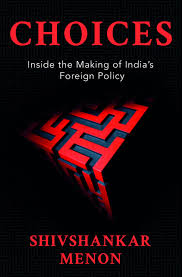Book Review : Choices :Inside The Making of India’s Foreign Policy – Shiv Shankar Menon
It was graceful of Shiv Shankar Menon , former NSA and Foreign Secretary , to agree to speak in the function to launch Bharat Karnad’s seminal work ‘ Why India is Not A Great Power ( yet) in which even he was amongst those criticized by the author . He was able to put forth his point of view so effortlessly .It is even better that now he has come out with a book that explains the reasons behind decisions and the choices available to Indian Foreign Policy Makers . To those who are new to the subject , book gives a very interesting analysis of events and lucidly explains the reasons and steps taken to implement the Indian Foreign Policy .
The only regret about the content is that it is about past . Author does not indulge in crystal gazing into future . But he has adopted a truthful narative style so speculation would be out of place in the book . But he could have listed the future challenges to make it more useful .
The book starts with Narsimha Rao’s reaching an accord ‘1993 Peace And Traquility Accord ‘ with Chinese in which both sides agreed to maintain peace and tranquility on the LAC without reaching an accord on boundries. . Both sides were pragmatic enough as not to try smartness and thus giving edge to India in air defence while Chinese had the advantage of terrain .Chinese too were not interested in border skirmishes and maintained a peaceful border till recently when president Jiang started rubbing in China’s superior status in provoking incurssions in Laddakh etc . India is not taking it lying down . However both sides have moved forward thus ending the 20 km withdrawl by Chinese .
It has benefitted both the countries as Indo Chinese border has remained much more peaceful than Indo Pakistan border .
Indo US Civil nuclear deal is the next . The deal marked an end of thirty years of US efforts to make India roll back its nuclear programme . It seems in these years efforts were made to blackmail India by nuclear threats . President Bush is given the credit to clear and change US laws to permit the deal with India . Manmohan Singh too had threatened to resign if congress did not support the deal . US side jokingly asked that will you buy nuclear reactors from us . Bush admonished the team that it is not the agenda.. Indian interests including right to process uranium for weapons were respected . With the agreement done US bulldozed rest to agree to let India get nuclear fuel . Even China agreed which now under Jiang it is not agreeing for full membership of NSG.
Although both India and USA are victim of too much hopes being belied but both sides agree about the direction being right even if the speed is slow .
Mumbai and cross border terrorism is the next item . India not attacking Pakistan in retaliation is the main issue . ‘The Choice of Restraint’ is the most hotly contested chapter but Menon does a good job of defending the decision . His case is that India has gained much more internationally and Pakistan and particularly its Army and ISI have lost by the rogue army tag attached due to Indian restraint. aN attack would have strengthened the Army in Pakistan which would have come into the driving seat. A direct attack or an inconclusive war would not eliminate the non state players of terror in Pakistan .
He admits to no other solution being available or stops short of Parrikars declaration that terror will be replied with terror.
Sri Lankan crisis and Prabhakaran’s death are examined .China’s shadow looms over Indian options . India acts with a view to keep Sri Lanka broadly on its side . The last issue is ‘No fist use of Nuclear Weapons ‘policy but it does not attract any serious examination .
The book is well written and does convince you of Indian foreign policy being handled competently .
